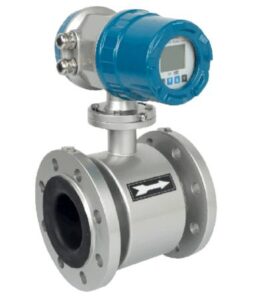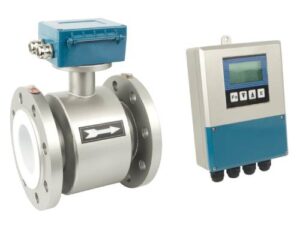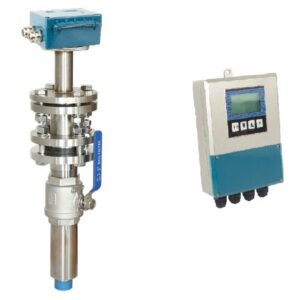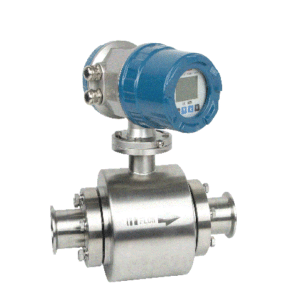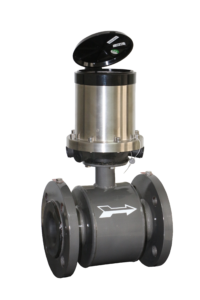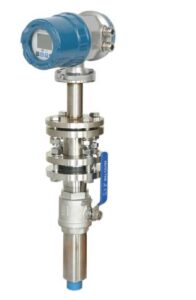How to Select a Magnetic Flow Meter?
Well, when choosing a magnetic flow meter, you should consider some factors to ensure that you get one that suits your needs. Besides, getting the wrong one will not only mean less efficiency but also trouble. Luckily, there are many types of flow meters in the market and the best one will help you collect the crucial data.
What is a magnetic flow meter?
A magnetic flow meter is a volumetric flow meter that doesn’t have moving parts. It works best with dirty liquid and is ideal for wastewater applications. They also work best in situations where low maintenance and low pressure is needed. However, they don’t work with distilled water, hydrocarbons, or most non-aqueous solutions.
How does Magnetic Flow Meter work?
Magnetic flowmeters use magnetic fields to enable liquids to flow through the pipes. When a liquid flows through its magnetic field, it produces a voltage signal. And as the speed of the fluid flow increases, so does the voltage signal being generated increase. There are electrode sensors found in the walls of the flow tube which pick up this signal and relay it to the electronic transmitter which then interprets this signal on the ideal liquid flow.
Well, your needs will affect the type of magnetic flow meter you will buy. But the above guidelines generally apply when selecting a flow meter:
- If you need a meter for large pipe uses, then get an insertion magnetic flow meter
- If you need a meter for high accuracy or high flow rates applications, then choose an in-line magnetic flow meter
- Finally, if you need a magnetic flow meter for low flow applications, then you will go best with a low-flow magnetic meter.
Factors to consider when choosing a Magnetic Flow Meter
Well, if you’re planning to get a magnetic flow meter, then the factors below will help you get the most ideal device. These meters are the favorite for many when you are considering cost, longevity, and accuracy. The tips below will help you make the right choice:
1. Cost
The top consideration when choosing a magnetic flow meter is the cost. How much are you willing to spend and as the accuracy and quality increase so does the cost. Therefore, you should consider the costs and ensure that you get a highly accurate device at a decent price.
Besides, you will get your returns on this investment in under six months. And higher accuracy is ideal during flow metering and is ideal for many applications.
Considering that magnetic flow meters have no moving parts, they require minimal maintenance. Their average life service is 30 years and you may have to clean the electrodes based on the water quality, fluid media, and the manufacturer’s recommendations.
As you compare the different flow meters, you should also calculate the installation and maintenance costs and the cost of the device over its lifespan.
2. Power Supply Requirements
Also, the power supply is another major factor to consider when choosing a magnetic flow meter. Power is needed to operate this device and you should whether electricity is available in the area you’ll be operating this device. If your needs require you to install the flow meter in a remote location with no electricity, then you should choose a battery-powered meter.
Battery-powered flow meters are ideal for areas with no electricity and will help you solve power issues. Most of their batteries can last for 5-10 years based on the manufacturer’s specifications. But if there is electricity, then go for a 230V AC or 24DC based on your power requirements.
3. Type of Application
To understand your application well, you will need to know the fluid media, flow range, media temperature, and pressure. And since these flow meters only operate with conductive liquids, it’s impossible to use them to measure gasses flow. Regardless of whether you are using wastewater or drinking water as the fluid media, the most ideal electromagnetic meter varies based on the type of electrode material and the sensor coating that will be in contact with the fluid media.
Once you understand the media you want to measure, it will be easy to know the whole application. This is important since for instance some flow meters are used to measure 150-psi while others work with 300-psi applications and you cannot interchange them. Most of these flow meters come with a specification sheet that indicates the temperature and pressure rating of the meter being discussed. Ensure you choose a meter with the required specifications of your application.
4. Accuracy and Range Accuracy
What is the accuracy you want in your measurements? Generally, magnetic flow meters are accurate devices but then they have some little errors without head loss. Whether you have a full-profile insertion mag meter or a full-bore mag meter, ensure you choose a meter that offers you the accuracy you desire.
The accuracy of your meter depends on its reading accuracy. The accuracy of the meter refers to the degree of precision that it offers when measuring the flow rate.
5. Upstream/Downstream Piping
When the magnetic flow meters are located closer to pumps, elbows, valves, and any other obstruction, then it will affect its performance. These flow meters require less upstream and downstream in the pipe. The downstream/upstream considerations depend on the application of the meter: whether it’s for a retrofit, new piping project, or line expansion.
From our discussion above, you have noted that there are many factors to consider when choosing a magnetic flow meter. There are some advanced considerations and also some that depend on your model. The best way of getting help during your search is to team up with experts in your specific field. Experience is gold.
The experts are those people who know the complex or advanced information on magnetic field meters and how to choose the best ones for your application. Once you choose the most ideal magnetic flow meter, your next task will be installing it. You will also find some handy tips on our blog about how to install the magnetic flow meter.

